New students should preferably have completed and passed a research Master's degree in any of the branches of Human and Social Sciences, either at the University of Almería or at other universities. They can also have completed Master's degrees from other branches, although in this case one must take the appropriate training supplements defined in the program’s admission criteria.
1. Direct access to this Doctorate without training supplements.
These studies can be accessed directly by:
1.1. Those students who have obtained a degree in any of the following Official Master's at the University of Almería with a research profile. Currently, these Masters are: Master’s in English Studies; Inter-university Master’s of Higher Studies in Philology and Classical Tradition; Master’s in Gender Studies: Women, Culture and Society; Master’s in Migration Studies, Social Intervention and Development; and the University Master’s in Social Communication.
1.2. Students who have obtained Official Master's degrees from the branches of Art and Humanities and Social and Legal Sciences (with a research profile) at other universities or PhD Program Training Periods of a similar quality and subject matter.
2. They will be able to access these studies by taking training supplements up to a total of 18 credits, from among the methodological subjects, and by completing a Master's research project:
2.1. Those students who have obtained a Master's degree with a professionalizing profile in the related Master's studies shown in section 1.1.
2.2. Those students who have completed masters in the branches of Art and Humanities and Social and Legal Sciences with a professionalizing profile, or PhD Program Training Periods in Art and Humanities.
3. They will be able to access these studies by taking training supplements up to a total of 30 credits, from among the methodological subjects, and by completing a Master's research project:
3.1. Students who have completed Official Master's degrees from other branches with a research profile or PhD Program training periods from other branches.
3.2. Students who have completed Official Master's degrees from other branches with a professional profile.
Access via mobility, from other countries outside the EHEA, in accordance with the specific agreements that are established, and with the current legal provisions. For foreign students, a level of Spanish equivalent to B-1 will be required.
Admission to the PhD Program will be assessed by the Academic Committee, who will review the contents of the master's degrees completed and will also review the specific mobility agreements and the link between the research lines and the master's degree accredited to the student. However, in general, the PhD Program’s Academic Committee may, in a reasoned way, and at the request of the interested party, recognize or validate the training supplements in whole, or in part, based on the training accredited to the student.
Completing the training supplements, amongst those specified in section 3.4 of this report, should preferably be carried out during the first year of study and, in any event, before the end of studies.
In the admission procedure, a doctor from the program must agree to direct the thesis and be the doctorate’s academic supervisor.
In accordance with the current legal provisions, these systems and procedures will include, in the case of students with specific educational needs derived from disabilities, the appropriate support and advisory services, which will assess the need for possible curricular adaptations, itineraries or study alternatives.
The admission criteria will be the same for full-time and part-time students, who will have to establish and justify their time commitment in the admission application.
In the event that the demand is greater than the offer, the PhD Program’s Academic Committee will decide on the admission using scientific-technical and academic assessment criteria. Priority will be given in this order:
- Students coming from the doctorates that are to be removed, as well as from the research itineraries of the official Master's degrees listed in section 1.1.
- Students coming from the research itineraries of other Official Masters from the branches of Art and Humanities and Social and Legal Sciences.
- Students coming from the professional itinerary of other related Official Masters.
- Students from the remaining Official Master's degrees.
Within each of these groups, the selection criteria will be:
- Academic record (Degree + Master’s) (50%).
- Curriculum vitae (30%).
- Language skills (10%).
- Personal interview (10%).








